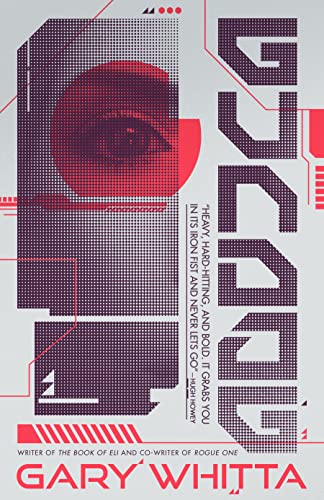Gary Whitta's Gundog follows Dakota (why couldn't it have been Yoshimi?!) as she escapes a work prison run by the Mek, a hostile alien race of robots. She follows a cryptic map once tattooed on her brother's now missing arm and also tattooed on the arm of a drifter named Falk that shows up in the prison camp. The robotic Mek don't really have any reason to keep the humans around other than perhaps as some kind of trophy. Whitta doesn't give us much to go on about the Mek, other than that they are cruel, advanced, and in the habit of taking over planets. They are easy to loathe and, really, they are cannon fodder.
Dakota's mother, Rosie, was a Gundog gunner, and a fairly good one, we're told, making her last stand at the Battle of Bismarck and dying with her 'dog. The Gundog is a nod, nearly in name as well, to Gundam Wing. Similar to the wings, the Gundog is a mech piloted by humans with lots of guns (but no dogs).
Dakota follows the map and finds an AI facsimile of Rosie who has created a bigger, badder Gundog. Dakota, along with a diffident engineering genius named Runyon with an eidetic memory train to run the 'dog and then set out on a big 'ole vengeance tour. Dakota is hell bent on not shooting 'til she sees the whites of the Mek's eyes, which gets her and Runyon in a lot of trouble, as the Mek are tough and like to call in their position to legions of other Mek.
The emotional and relational aspect of the story all comes from Dakota and, at times, hits the right notes. Runyon has a thing for her but she's not into him because of Falk, who gets his leg sheared off when a Mek self-destructs. Falk then vanishes from the story (but not from Dakota's heart). Dakota sort of learns to love the one she's with and we get symbolic romance between Runyon and Dakota when they play field medic for each other and then huddle close for warmth sleeping in the empty midwestern cold. A bit of a problem is that Runyon is underdeveloped and just too doggishly obedient to Dakota to register as a real person. But, hey, Dakota is the gunner and Runyon is her obedient dog in this Gundog story, and it's enjoyable.
The Gundog has a nifty ability to scrap found metal to regenerate itself. That's fortunate since the Mek have superior firepower, including orbital weapons a la Akira, swarms of Mek with nasty weapons, and more (you've got to read to find out)!
Whitta's pacing in Gundog is solid. This book is a page turner. It's exciting. It's fun, and the fight scenes bring the Gundog to life.
A flaw in the book is that foreshadowing elements are brought up one sentence ahead of the event that the foreshadowing foreshadows. That robs some of the enjoyment of reading. Consider the phrase, The pleasure of a play is in knowing how it ends. The careful reader enjoys putting together the shreds and hints of what is to come and guessing what will happen. But there's no guessing when the foreshadowed bits occur right before the event. Part of the issue is that a lot of the backstory--or maybe all of the backstory--gets told in narration, so there really wasn't much space to insert foreshadowing.
Oh well. Like the Gundog dutifully walking the length of the emptied American midwest, I muscled my way through Whitta's military science fiction novel to arrive at a final showdown that did not disappoint.
So, what does all this stuff mean? Well, for starters, the book is a love song to the military might of the US. The message is that even if other nations come up with advanced technology ahead of us, we'll figure it out and create something better, something more fearsome that we will not hesitate to use as we blast our enemies to kingdom come.
The work camps and the Mek cruelty vaguely read as a WWII Nazi death camp narrative, but the message here is more about the challenges of the future rather than the trials of the past.
The Mek, short for mechanical, fit into the Skynet/Matrix robot trope. The computers are smart and turn humans into a slave class. But to beat them, we'll have to send humans into computer spaces. By invading computers with human personalities, we can humanize the cold, logical computing space and so liberate humanity from a man-made oppressor. The tension in the novel is that the Mek are computer-based intelligence, but so is Dakota's mother, Rosie, and by working with the AI human personality, Dakota outwits the evil robots.
End Transmission.
